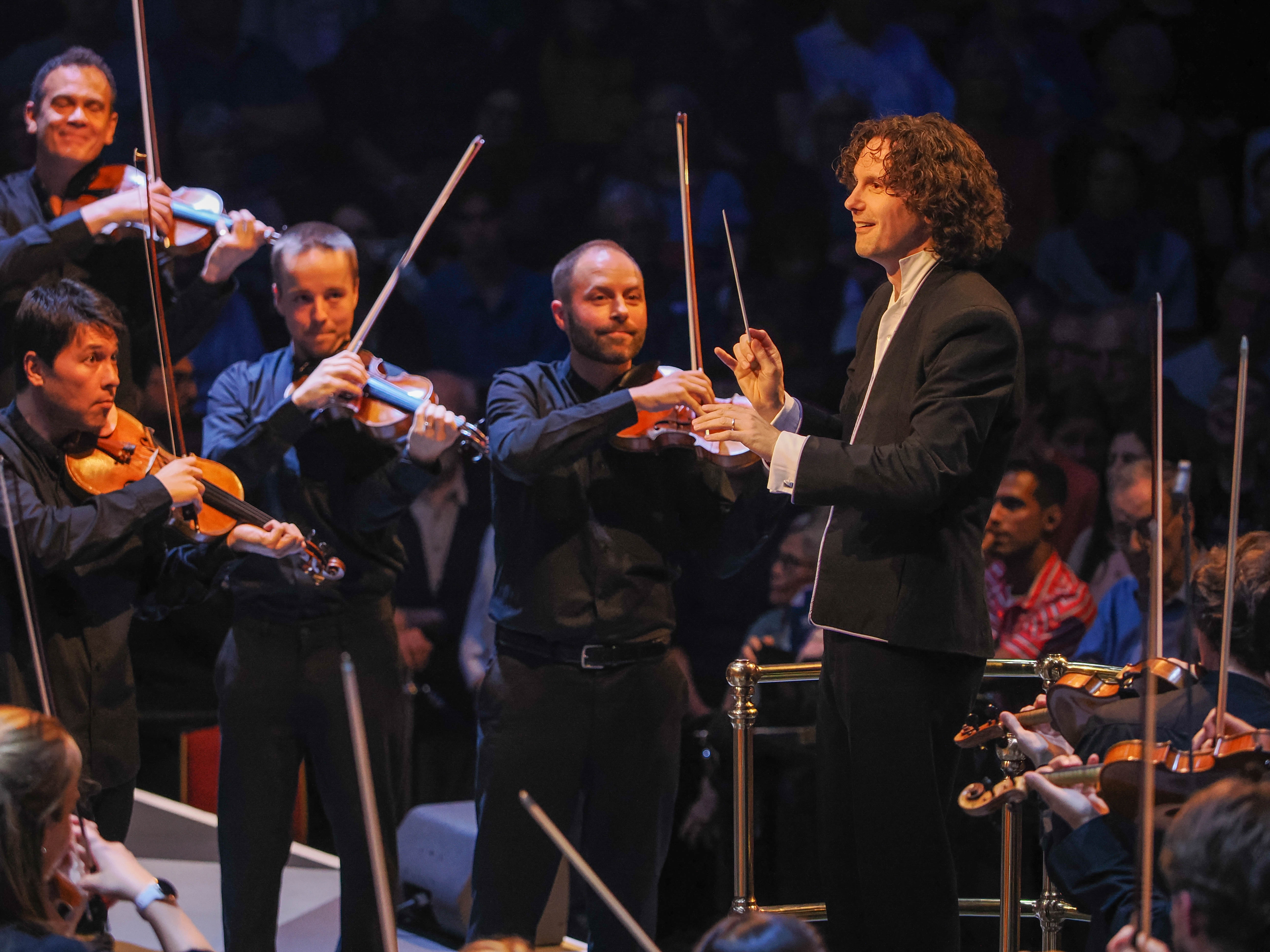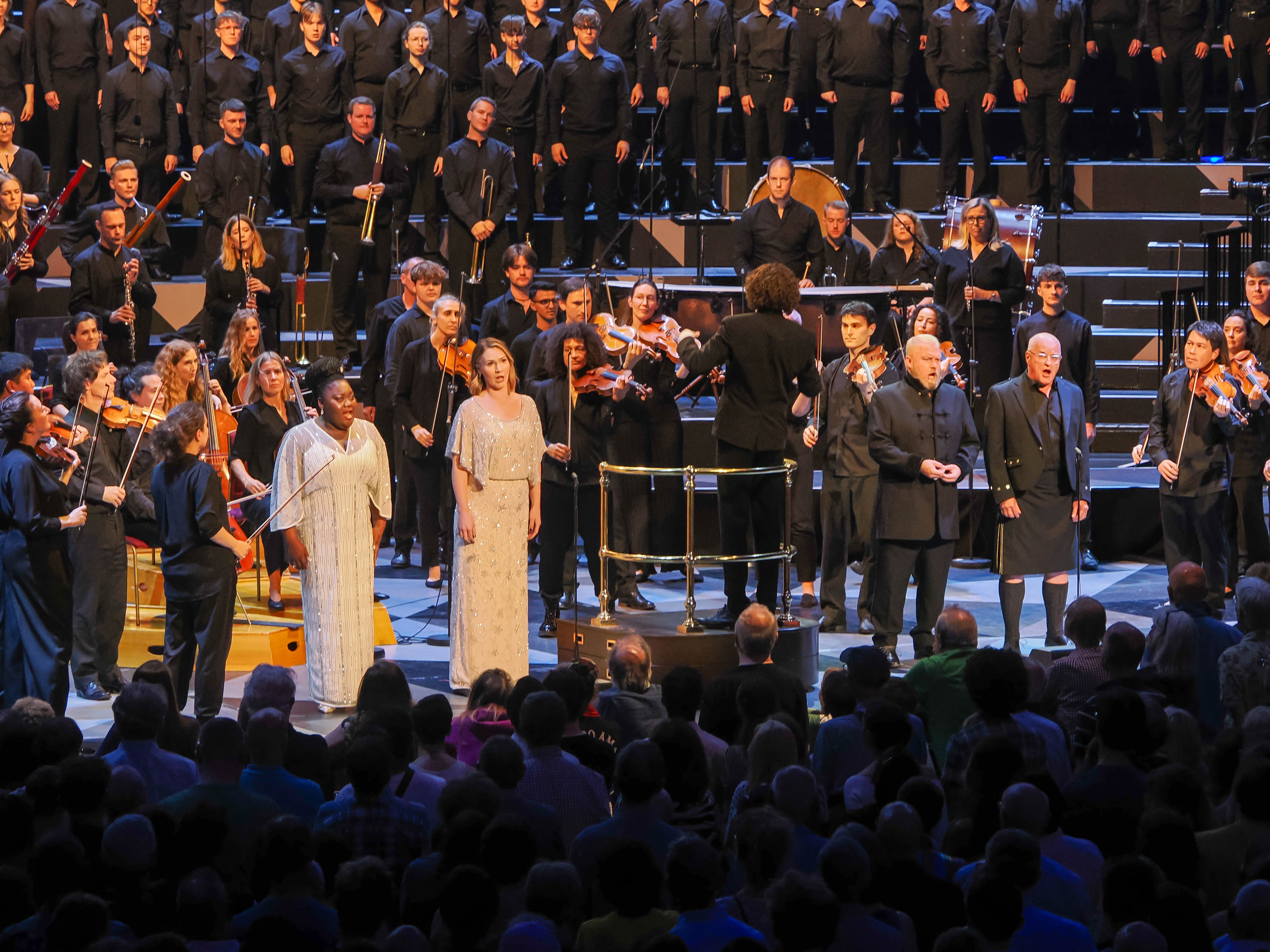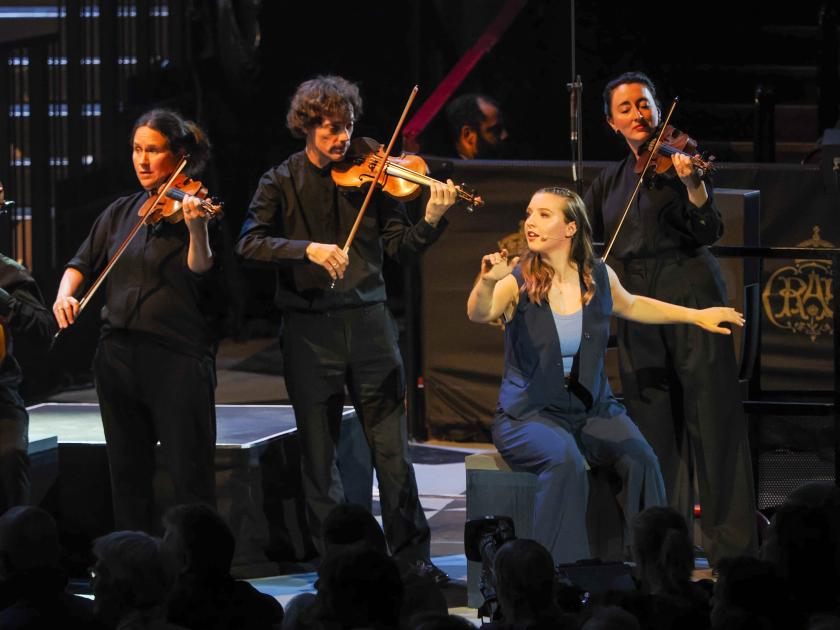Hugh Masekela used to give advice for concerts like this one: “If you haven’t got tickets, turn yourself into a cockroach.” Every seat for Aurora Orchestra’s Beethoven’s Ninth by Heart Prom had already sold out on the first morning when season booking opened back in May, and the queue for returns at the Royal Albert Hall last night must have had well over a hundred people in it.
This performance, preceded by an illuminating, engaging and amusing 45-minute “musical and dramatic exploration”, was a reminder of quite how far Aurora has grown in confidence and stature, and has evolved its particular ways of innovating and storytelling. Next April will mark 20 years since the orchestra’s very first concert at Wathen Hall in Barnes, and this is the 11th successive Proms season in which the orchestra has performed a work from memory. The scepticism in the air when they did their very first, Mozart 40, in the Proms season of 2014, has long since evaporated.
In a note in the programme by Jane Mitchell – Creative Director of the orchestra, scriptwriter for the "exploration" and also the orchestra’s principal flute – described last night’s concert as “a monumental task... perhaps our most challenging to date.” Beethoven’s magnum opus, with its epic sweep from minor to major, certainly lends itself to having its story told, and Mitchell has truly found a gold-mine in Beethoven’s Konversationshefte (Conversation Books), now available in English translation. In these note-books, Beethoven would require people to write down what they wanted to say to him. These one-sided conversations were used to bring the story of the evolution of the work to life. It was told vividly and entertainingly by actors Rhiannon May and Tom Simper and by conductor Nicholas Collon. And whereas such exegeses can run many risks in a concert setting, this one kept its momentum and interest going throughout. It just felt right and definitely didn’t overstay its welcome. Mitchell and Collon have found all kinds of clever ways to use the music, the actors, the musicians, members of the BBC Singers, and indeed us in the audience, to tell the story, and also to keep Beethoven’s deafness front-of-mind.  For the performance of the work in the second half of the concert, Aurora had re-assembled a remarkable collection of players, many of whom have a long-standing association with the orchestra and are now in their absolute prime. Violinist Alexandra Wood led the original Mozart 40 performance in 2014 and was back in the same role last night. And for wind principals of the quality of clarinettist Timothy Orpen and bassoonist Amy Harman to commit to this ambitious project is a sign of the unswerving loyalty and belief that exists among these top players for Aurora and its ideas, methods and its ideals.
For the performance of the work in the second half of the concert, Aurora had re-assembled a remarkable collection of players, many of whom have a long-standing association with the orchestra and are now in their absolute prime. Violinist Alexandra Wood led the original Mozart 40 performance in 2014 and was back in the same role last night. And for wind principals of the quality of clarinettist Timothy Orpen and bassoonist Amy Harman to commit to this ambitious project is a sign of the unswerving loyalty and belief that exists among these top players for Aurora and its ideas, methods and its ideals.
The whole practice of performing from memory does bring about a particular kind of communication and buzz on the stage. I found myself completely mesmerised by watching the double bass section at one point. During the first eighteen bars of the adagio movement, they don’t play. They all wait, poised to land their first quiet and delicate B flat. Their collective expression of total stillness, like the silence waiting for the first speaker at a Quaker meeting, stays with me as a wonderful and inspiring portrayal of calm.
Aurora always have a sixth sense of the dramaturgy that a work will need in performance, and the canvas of Beethoven Nine gave the pretext to do something remarkably controlled, precise, and unbelievably effective. The transformation of the work from a symphony to an oratorio is one of the most remarkable sequences in Western classical music. So, rather than having the chorus in place from the start, Aurora had clearly wanted to tell the story of that astonishing transformation. In the section leading up to the moment when the baritone (a characterful and splendidly be-kilted Christopher Purves, pictured below with the other three soloists, photo BBC/Sisi Burn) utters the important word “Freunde”, we saw the stage suddenly and silently become populated by the chorus, as if the whole movement of hordes had been choreographed into the score and timed to the second.  This was a remarkable moment, which put any misgivings one might have had about other aspects of the performance in their place. True, there will be performances of this work with more of the sense of control and “hold” and the coiled spring, rather than momentum and keeping the end in sight. Perhaps the second “Molto Vivace-Presto” movement could have had just a little bit more space for the remarkable wind principals to breathe and to be. But to have pulled off a dramatic coup in such style is what will stay in the mind.
This was a remarkable moment, which put any misgivings one might have had about other aspects of the performance in their place. True, there will be performances of this work with more of the sense of control and “hold” and the coiled spring, rather than momentum and keeping the end in sight. Perhaps the second “Molto Vivace-Presto” movement could have had just a little bit more space for the remarkable wind principals to breathe and to be. But to have pulled off a dramatic coup in such style is what will stay in the mind.
It is a paradox that the standard and the quality of story-telling in other art-forms than music has risen so wonderfully in an era when music has become commodified and de-contextualised. Against that background, Aurora deserve praise for consistently upholding the principle that music has its stories that can and need to be told, and told well. Through sticking to that principle, they created an extraordinary, genuinely unforgettable evening.














Add comment